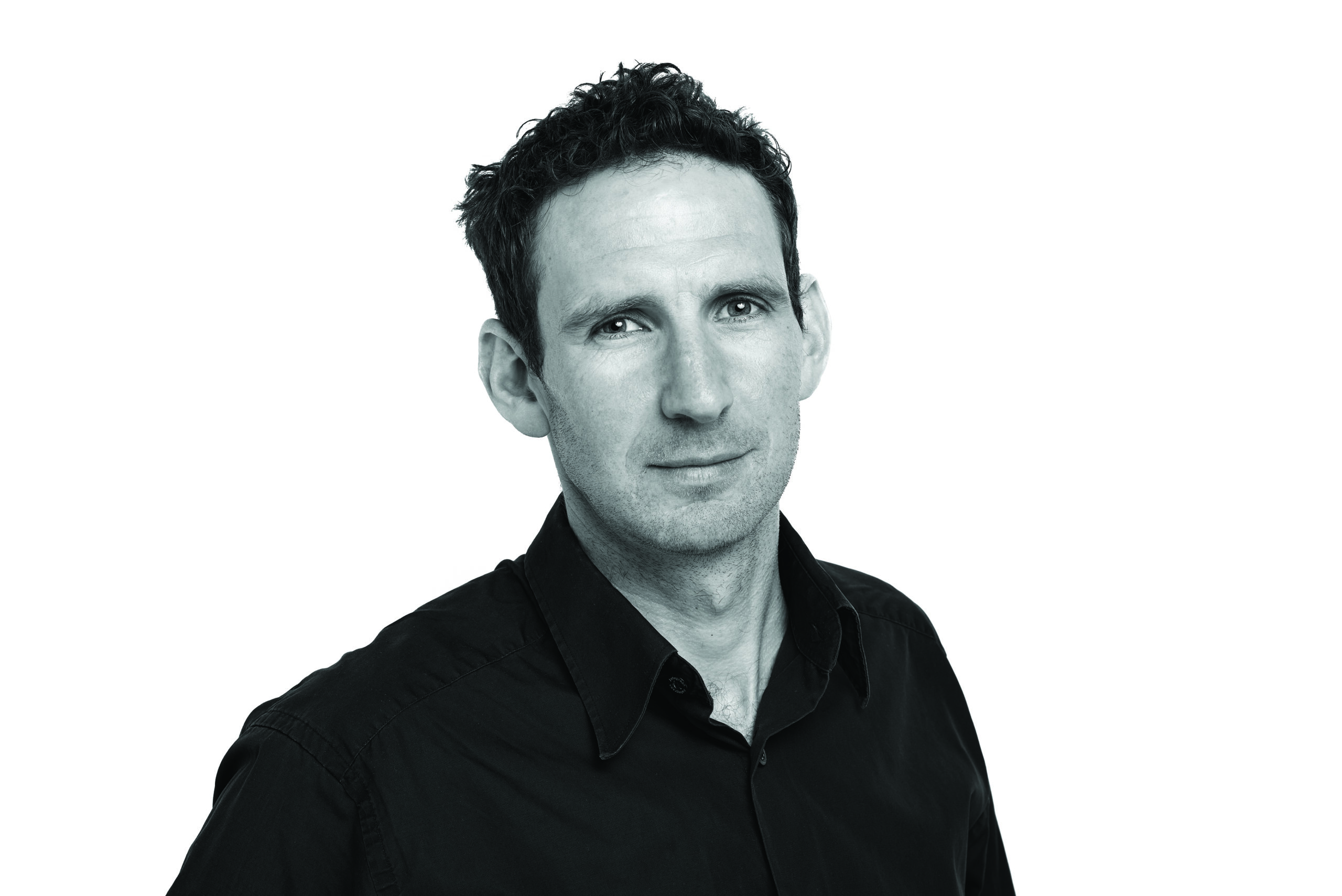As Jan Frodeno mustered mind and body at altitude in Andorra, the former Olympic and three-time Ironman world champion understood both the weight of expectation and size of the challenge ahead.
“We’ve never seen a world-class field come together on a course like this,” he said. “That will change the dynamics and there are certain athletes who are going to be very aggressive.”
If The Last Dance was the refrain in the build-up to his attempt to regain a treasured title last won in imperious style in Hawaii in 2019, by the time he landed in the south of France – with the artwork on his Canyon Speedmax inspired by the Saturn 5 rocket – it had been rebranded Mission Moonshot.
With hindsight there was merit in both titles. In triathlon, perhaps only Frodeno can draw parallels to basketball great Michael Jordan in terms of influence; Jordan’s Last Dance miniseries a smash-hit for Netflix. But Moonshot also signalled the cautionary note that triumph on Nice’s Promenade des Anglais was no given, and so it would prove.
At 42, Frodeno would have been four years older than Craig Alexander was when the Australian became the oldest men’s Ironman world champion in 2011. Instead, we saw 24-year-old Sam Laidlow crowned as the youngest-ever male winner.
Frodeno had also been struggling with a litany of injuries, which forced him out of Kona last October where his own course record was shattered by 11mins by Norway’s Gustav Iden – underlining just how much the standard had been raised.
In Nice, Frodeno knew he’d have to be better than ever on a course he wasn’t suited to, but as he gathered sponsors and media together in a pre-race get-together on the slopes of the Maritime Alps, he said he was in better shape than ever before:
“The overall level and depth of competition has gone up, so it will require stepping up the game. I don’t necessarily look at the numbers, but I know that I’m capable of doing what I did in 2019 and more.”
Even if it wasn’t pre-race bravado, it became clear that only a seismic effort could have held off the insatiable Laidlow, and the father-of-two was all class and high-fives as he accepted his fate and embraced the warmth of the home crowd. Twenty-fourth place wasn’t in the final script, but neither will it define Frodeno’s career.
“The gladiator went into the arena and it was the last lion that got him,” was his summation. If so, the coliseum all raised thumbs and cheered as he left.
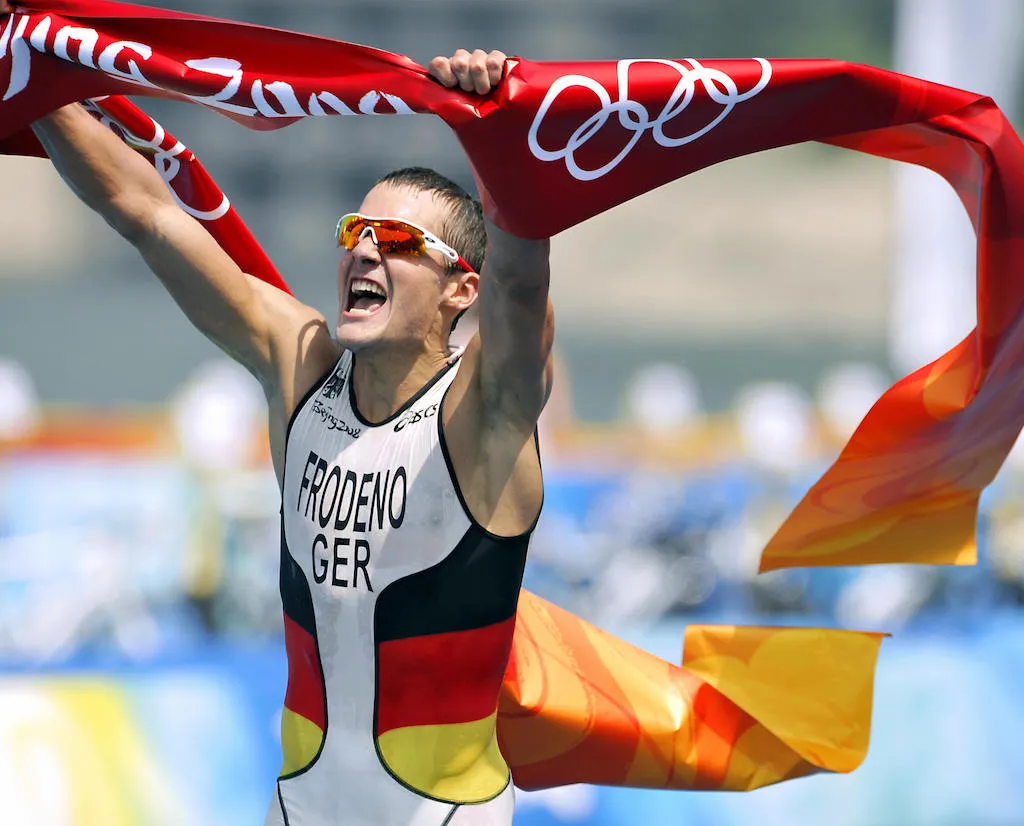
A star is born…
Day one of retirement, 8am, and a familiar scene is unfolding. Frodeno gingerly edges himself towards his bike attached to the Zwift Hub on the decking of one of the many beach restaurants on the Cote d’Azur you’d book for the location alone.
Oakley shades on, the team can be forgiven for being a little fuzzy over what time yesterday ended and today began, and while he’s arguably in better shape than any 42-year-old in the world, right now Frodeno is feeling all of those 42 years.
The session is a social group ride for Zwift, one of his many sponsor commitments that haven’t ended at the finish line, but as he eases himself in and celebrates pushing up to 160 watts, it’s also a good chance for a few reflections on the career of one of the triathlon greats, if not the greatest.
Frodeno was born in Germany but moved to South Africa with his family as a 10-year-old, falling in love with surfing, before becoming a swimmer and then triathlete after being inspired by the Sydney Olympics of 2000.
Selling his bike to buy a flight to Germany to race the club circuit Bundesliga, he progressed to earn qualification for the Olympic team in 2008. Not yet having won a World Cup – the top level of racing before the World Series was introduced – few observers gave him much chance in China.
Reigning world champion Javier Gomez, who had also won the test event, would start favourite, but as the Spaniard faded to fourth, Frodeno outkicked Simon Whitfield, the Canadian he’d watched take gold eight years before, to land the coveted title that would change his life.
Australian Emma Snowsill, the victor in the women’s race a day earlier, wouldn’t need a sprint finish to win in a dominant display but it was serendipitous anyway. It might have taken the golden couple almost another two years to have a first proper conversation, but they would marry in 2013, and go on to have two children, Lucca Leo, and Sienna Sofia.
“It is where it all started, but it feels like forever ago,” Frodeno says. Indeed, racing both Gomez and Alistair Brownlee, who as a fresh-faced 20-year-old was also competing in Beijing and finished 12th, has given Frodeno some of his most cherished, and painful, memories.
“To this day, the Hamburg World Series race I lost to Javier in 2010 is probably one of the most satisfying. We were just at each other’s throats for 8km, and then he made the elastic snap, but it was rewarding racing.”
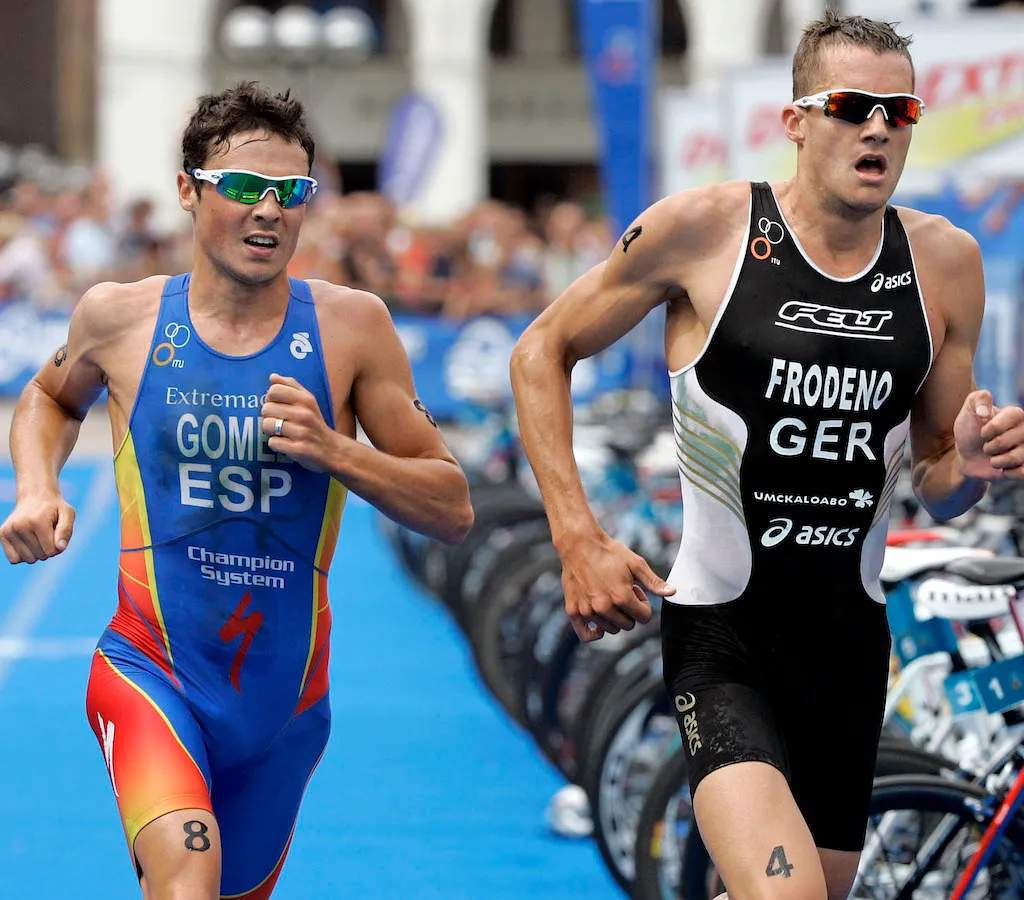
Reaching his peak
Frodeno’s short-course career never reached the heights of 2008 again, although he did have a ringside seat to watch the Brownlees and Gomez scrap it out at London 2012, where having battled back from injury, he finished sixth.
Instead, when he moved to long-course racing in 2014 – so beloved of his home nation – his stock would rise far further than ever before.
He was third in Hawaii on his first attempt as compatriot Sebastian Kienle won, but then Frodeno became Ironman world champion in 2015 and 2016, achieving the double in 2015 with the Ironman 70.3 world title.
In 2015 he was crowned male German Sports Personality of the Year, an honour previously bestowed on the likes of Boris Becker and Michael Schumacher.
In 2016, he also set a new benchmark for the full-distance in Challenge Roth of 7:35:39. For context, second-place Brit Joe Skipper ran a faster marathon than Frodeno on that day, and still finished almost 21mins behind.
At heart the real rivalry was still with Brownlee and Gomez, though, but with Brownlee focussing on Olympic success and Gomez making only occasional forays into non-drafting racing, what scarce battles there were – such as Gomez beating Frodeno into second in the 70.3 worlds in Mont-Tremblant in 2014 – were to be treasured.
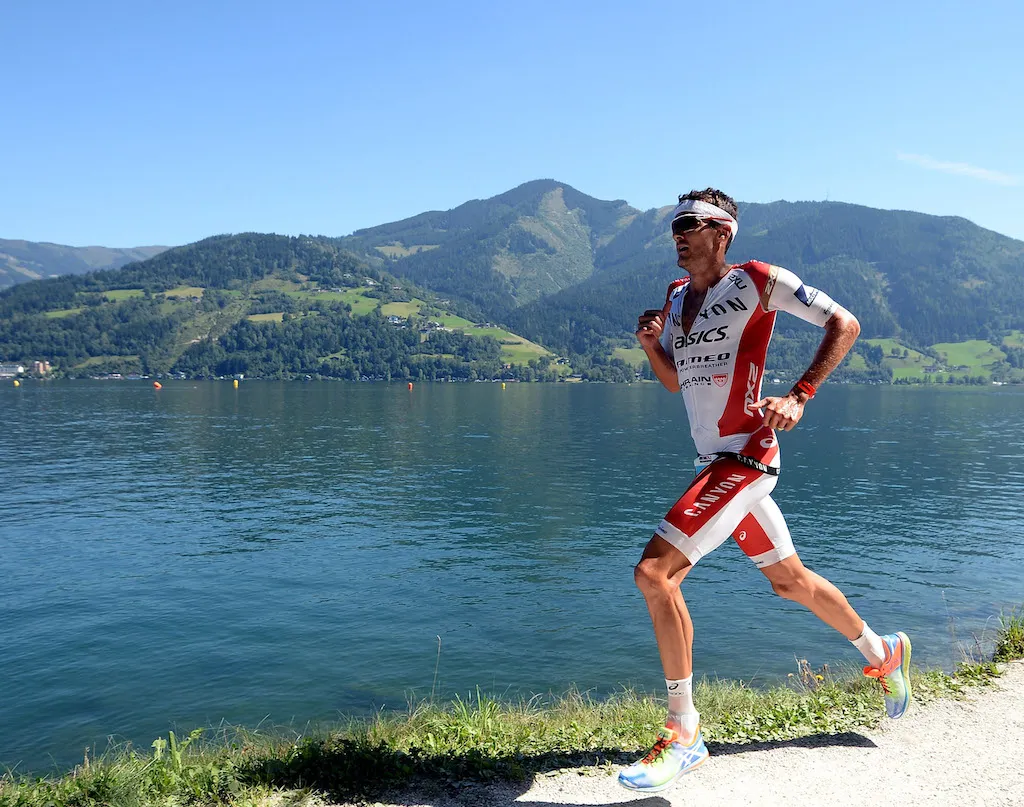
Kings of the sport
The match-up the triathlon world had wanted only came once, in 2018, in Port Elizabeth, South Africa, where the trio started the half-marathon together before Frodeno landed a 1:06:33 to beat Brownlee by a minute.
If London 2012 was short course par excellence, this was the middle-distance equivalent. It was also Frodo’s second 70.3 world title.
“That will be up there as one of my favourite races,” Frodeno adds. “After all the blows they dealt on the Olympic distance, to deal some blows as well.
"I’ll never take part in this whole GOAT [Greatest Of All Time] discussion, but I do think Alistair is right up there. Both have struggled with injury quite badly, but I really wish for them to have another season or two like I just had. To me they are the kings of the sport.”
If true, then it also holds for Frodeno. The other race he picks out as a favourite is unsurprisingly Hawaii in 2019, where he set another course record of 7:51:13, taking it away from defending champion Patrick Lange as Frodeno won by more than 8mins from USA’s Tim O’Donnell.
It was made all the sweeter because a back issue had ruined his chances of defending his title in 2017 (although he did honour the race by finishing, even if the marathon took over an hour longer than in Nice). Then in 2018, almost immediately after the 70.3 success in South Africa his plans were ruined again by a stress fracture in his sacroiliac joint.
As injury began to become a recurring theme, every year there was a conversation about calling it a day. “I was going to retire last year but ended up in hospital and asked Emma if I could have one more. She was all-in from the get-go. It takes a village [to support], and without my team and my family I’d never have gotten close.”
Frodeno was absent for both Ironman World Championships in St George and Kona in 2022. The latter was down to an infected hip following a bike crash that ultimately denied him a farewell to the Big Island he craved, but it shouldn’t detract from his era of dominance.
He won 13 straight races from 2019 to 2021, and his only defeat in 2015 and 2016 was a rare loss to USA’s Jesse Thomas in Lanzarote.
Asked when he believes he was at his physical peak: “It’s hard to say, but a month ago I was very much at one of those,” he says. At that time, it looked like Mission Moonshot might be on.
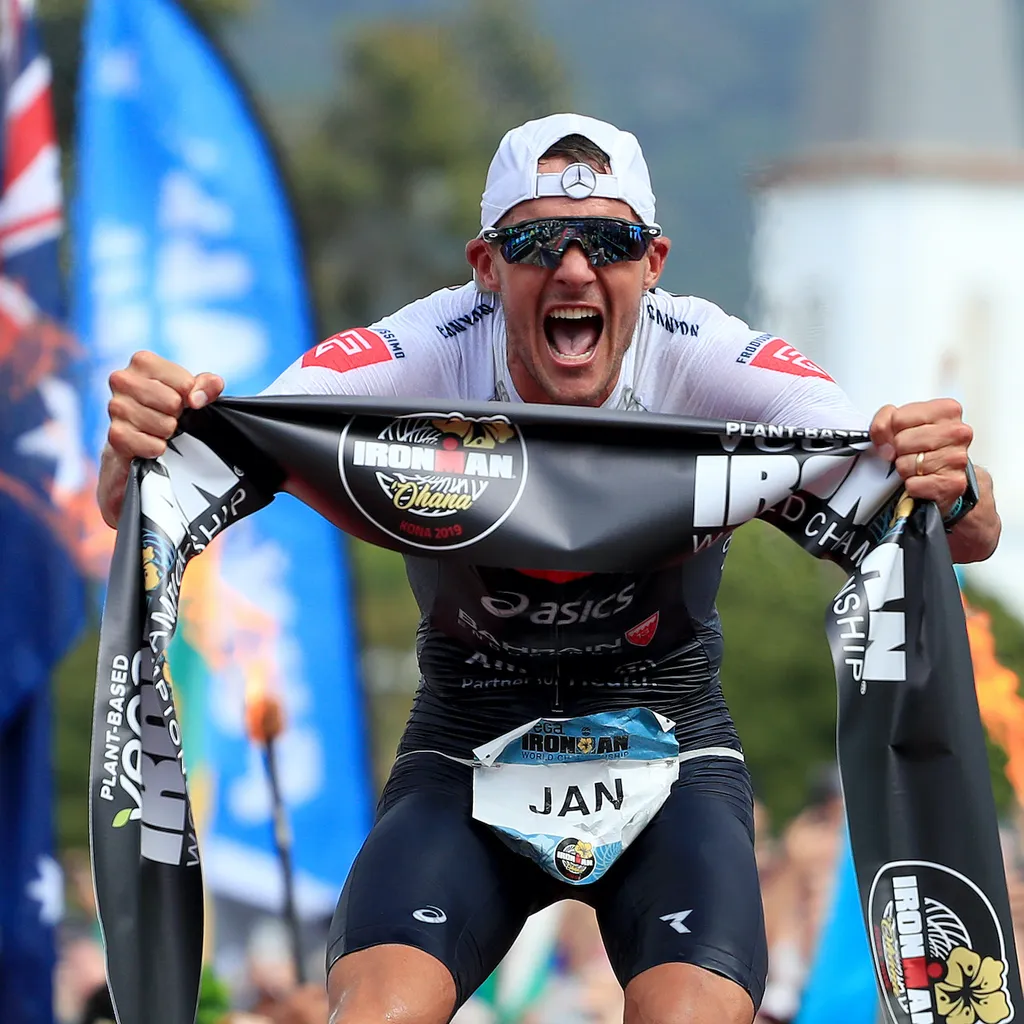
Flashes of brilliance
It was never going to be a vintage year for Frodeno after early defeats in the PTO European Open in Ibiza and then placing fourth amid the tragic scenes at Ironman Hamburg, where a moto rider lost their life.
But having won the PTO US Open in Milwaukee, defeating Olympic champion Kristian Blummenfelt in the process, it seemed there might be a chance in Nice, despite openly criticising Ironman’s decision to split the world championship venue and move the men’s race to France [see box below].
Frodeno on the future of the Ironman World Championship
“I love the race, I love the event, and I understand the concept of what they are trying to achieve, but I believe that Kona is still the one thing that puts triathlon on the map. Somewhere along the line it got termed a world championship, but people who don’t know about triathlon just want to know whether you’ve done Hawaii before.
“I’m open to discussions about progressing the sport and recognising the needs of the community, but man it’s a stupid idea to separate men and women. It feels like boarding school. I don’t get it. It worked for 40 years, and the equality argument is rubbish because it’s been the most equal sport.
“It’s such a family event, it makes no sense to me. I understand the numbers and business model, and that Ironman is a sports events company, but we need to find a solution where men and women race together. As a spectator you’ve got two races and I thought it was a strange kind of testosterone party yesterday. I’d like to see the racing come back together and grow in a different way.”
There were more injuries to overcome as he prepared at home in Andorra, where Frodeno had moved from his long-term base in Girona last summer. But once the race started on the Cote d’Azur, he looked his usual graceful self, even leading for a chunk of the 3.8km swim.
“I had no point to prove,” he says. “Just swimming in the Med at sunrise; the water being amazing. It felt good.”
Frodeno had shoved a plastic bag down his swimskin to help him pull his tri-suit up more easily in T1, and quipped pre-race that it was the last $10,000 prototype he’d be using in his career.
"I think I was probably a bit too relaxed and may or may not have been in retirement mode," he says. "I’m not sure what happened, but when the race didn’t go well, I accepted it, whereas in Ironman half the battle is to talk yourself into it again.
"I went into the first climb pushing 500 watts and was getting dropped. I knew a lot of people would come back, but I didn’t think everybody would. I kept my head positive until the top, but felt my suit flapping [the tri-suit had ripped as he’d tried to pull it up in T1] which is a bit of a… mind setback, let’s call it that!
"But I was always realistic about my chances. I’m not a power-to-weight athlete. There have always been people who’ve been stronger on the climbs than me.
"You can get away with it on a 5min climb with willpower and fitness, but even riding the best I ever have, I’ve got to accept there’s a new generation who are just really good.”
Frodeno is searingly honest about his physical attributes. “I was always that guy who at every sports test would have a long list of things saying why I shouldn’t be a pro: a lack of range of motion; not enough VO2. The pure physical talent required to be at the very pointy end of a proper bike race I’ve never had, but normally through efficiency, aerodynamics and decent power, I could get through.”
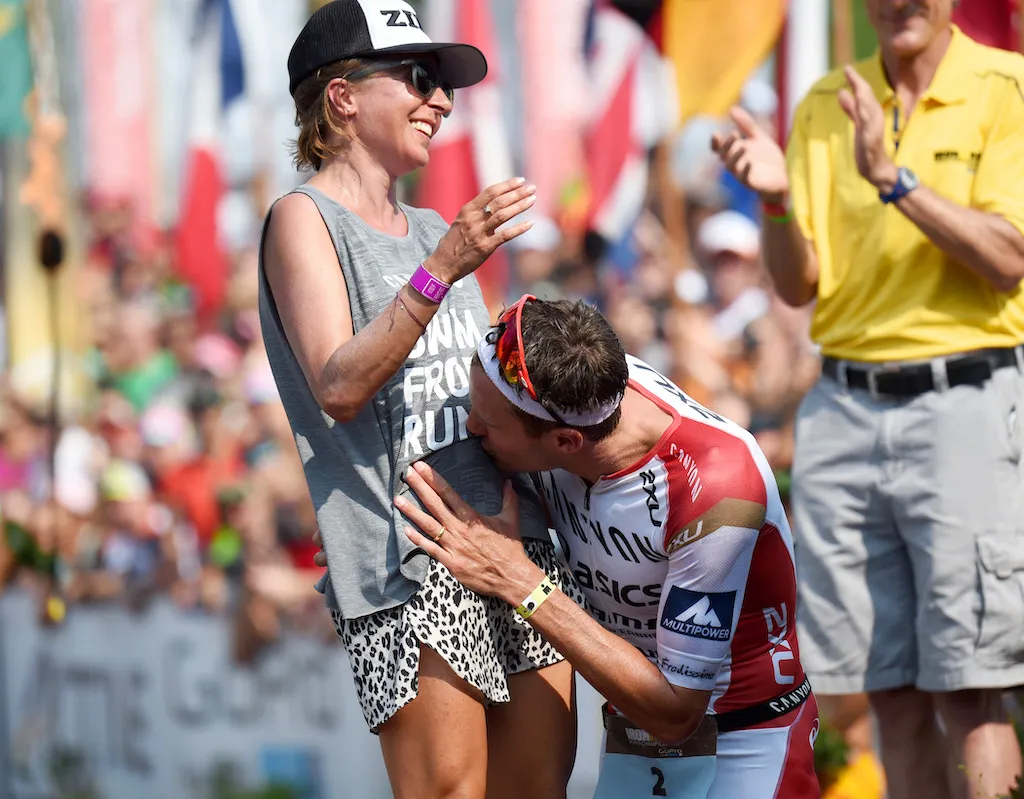
Time to fly
It might not have been a victory lap of honour, but the marathon did become four 10km circuits where Frodeno could appreciate the adulation of onlookers who understood its significance.
“It was definitely emotional and put a smile on my face. I always said this race could add something [to my career] if I win, but whether I’m fifth or 20th doesn’t change anything… A couple of guys did try to hand me a cold beer, and I was so tempted I would almost have taken an outside assistance penalty for one, but I can genuinely say, I’ve no remorse.”
Frodeno has no plans to return to do it all over in Hawaii in 2024.
“When I look at what it takes, and my motivation and hunger and where I’m at in life, I made peace with the fact that I’ve had a beautiful ending in Kona, with what at the time I thought was the perfect race. Hawaii can be very rewarding, but it can be very brutal. Apart from the motivation, I’m not sure my body is up for it.”
The adrenaline rush will be sated by some skydiving or foil surfing – “all the things where you can really hurt yourself” – but once sponsor commitments are fulfilled, Frodeno really just wants to “shred some single trails with the kids.”
His son Lucca has a first mountain bike race coming up. He cites Emma as the example when saying: “If I’ve learnt anything it’s to keep yourself busy. Try to get a schedule and have a purpose.” Even if for now that schedule is school drop-off and pick-up and making a lot of pancakes.
As he removes the No.1 wristband for the last time, not being a professional athlete is going to take a while to sink in. “I’ll miss it all. Sitting here it’s weird because I don’t feel any different from yesterday, and I’m not leaving being fed up with the sport, but I realise the clock is ticking and I’m a bit envious of the guys starting their journey now. It’s a heck of a place to start.”
Frodeno’s advice to upcoming triathletes
“I don’t want to be as clichéd as saying follow your dreams, but make sure that you don’t get held back by people who don’t understand.
“Everybody thinks they know everything about physiology and sports science and how it all works. The truth is, we don’t.
“You’ve got to figure out your own path and what seems totally nonsensical in one moment might just work out, and then everybody does it, because you know what, it worked.
“Just go all-in on your dream and realise the more you dream the less many people can relate.
“Have your goal firmly in your mind and go out and find your own moonshot.”
Top image credit: Jan Hetfleisch/Getty Images for Ironman
